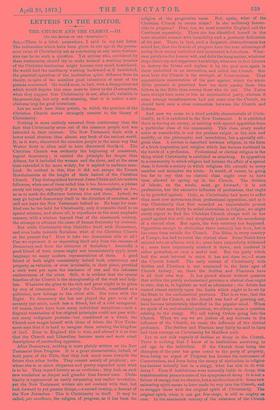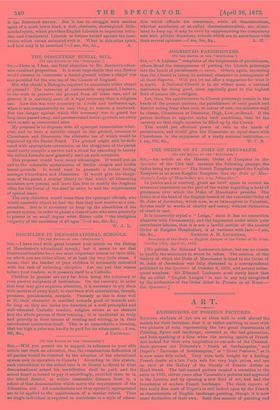LETTERS TO THE EDITOR.
THE CHURCH AND THE CLERGY.—Ill.
go THE EDITOR OF TH3 EPROTAT011."] SIR,—There is a hitch somewhere, I said in my last letter. The testimonies which have been given in our age to the perma- nent value of Christianity are as convincing as any mere testimo- nies can be on such a question. Yet anyone who, convinced by these testimonies, should try to make himself a working member -of the Christian institution might become very much bawildered. He would find the machinery working backward as if bewitched, the practical operation of the institution quite different from its theory, in spite of the manifest good intentions of most of the persons concerned. He would meet, in fact, with a disappointment which would dispose him once more to listen to the Destructives, when they suggest that Christianity is not, after all, valuable in the present day, but only well-meaning, that it is rather a mis-
chievous trap for good intentions. - Let me mark here three points, in which the practice of the Christian Church moves strangely counter to the theory of -Christianity.
Nothing is more entirely removed from controversy than the fact that Christianity arose out of the common people and was intended in their interest. The New Testament deals with a lower social stratum than almost any book of the ancient world. It, as it were, discovered the common people in the same way that Walter Scott is often said to have discovered Scotland. The Christian Church was evidently the beginning of consistent, logical democracy ; it carried the principle far deeper than Athens, for it included the woman and the slave, and at the same -time extended it far more widely, for it aspired to embrace man- kind. So evident is this, that it did not escape the French Revolutionists at the height of their hatred of the Christian -Church. They distinguished between Jesus Christ and his modern followers, when one of them called him le bon Sans-culotte, a phrase surely not inapt, especially if you lay a strong emphasis on bon, so as to mark the difference between him and them. Indeed, we may go beyond democracy itself in the direction of socialism, and still not leave the New Testament behind us. No hope for man- kind can be too bold for Christianity, only it commits itself to no special schemes, and above all, it repudiates in the most emphatic stunner, with a wisdom beyond that of the nineteenth century, the attempt to advance the cause of human fraternity by violence.
But while Christianity thus identifies itself with Democracy, and even looks towards Socialism, what of the Christian Church at the present day ? Does it take the democratic side at all ? -Can we represent it as separating itself only from the excesses of Democracy and from the chimeras of Socialism ? Assuredly a good friend of both causes might not inconsistently apply harsh language to many modern representatives of them. A good friend of both might consistently defend both aristocracy and property as valuable, or even invaluable, in their place, provided a curb were put upon the insolence of one and the inhuman exclusiveness of the other. Still, it is evident that the special function of the Church is the championship of the weak and help- less. Whatever she gives to the rich and great ought to be given by way of concession. Yet surely the Church, considered as a politician, now belongs to the other side. She votes with the Right. To democracy she has not played the part even of a severely just critic, much less a friend, but of a cold antagonist. Of course, there have been many individual exceptions—such a flagrant recantation of her original principles could not pass with- out many indignant protests—but considered as a whole, the Church now ranges herself with those of whom the New Testa- ment says that it is hard to imagine them entering the kingdom of God. Even in England this is true, and abroad it is so true that the Church and Liberalism become more and more exact descriptions of contending opposites.
After Democracy, nothing is more plainly written on the New Testament than Progress. It is a great characteristic, indeed, of both parts of the Bible, that they look much more towards the future than other books. They consist mainly of prophecy ; no- where else is so much eloquence and poetry expended upon what is to be. They regard history as an evolution ; they look on each new revelation as deeper and grander than former ones. Chris. tianity is represented as vastly surpassing any earlier revelation, yet the New Testament writers are not content with that, but look forward to yet greater things,—a second coining, a descent of the New Jerusalem. This is Christianity in itself. It may be called, par excellence, the religion of progress, as it has been the religion of the progressive races. But, again, what of the Christian Church in recent times? Is she uniformly favour- able to progress? Here, too, we must consider England and the Continent separately. There she has identified herself in the most absolute manner with immobility and a pessimist deification of the past. There, in fact, such a desperate obstructiveness has seized her, that the friends of progress have the rare advantage of seeing their enemy embodied and incarnated before them. What- ever paralyzes the human will, and dulls the imagination, whatever stays discovery and suppresses knowledge, whatever in fact labours to destroy the future and replace it by the past over again, is there embodied in an institution, and called the Church. But even here the Church is the strength of Conservatism. That superstitious consecration of the past against which the whole Bible protests is practised here too more among those who believe in the Bible than among those who do not. The Tories have always been more or less an ecclesiastical party, whereas if some strange transformation had not come over the Church, we should have seen a close connection between the Church and Reform.
And now we come to a third notable characteristic of Chris- tianity, as it is exhibited in the New Testament. It is exhibited there as having an enemy, as meeting with special opposition from a particular class of the community. This class, every reader notes as remarkable, is not the profane vulgar, or the rich and worldly, or the philosophic and incredulous, but a specially reli- gious class. A contest is described between religion, in the form of a fresh inspiration and religion which has become hardened in the hands of a profession. Professional or clerical religion is the thing which Christianity is exhibited as attacking. In opposition to a community in which religion had become the affair of a special class, it founds a society in which religious life extends to every member and animates the whole. It would, of course, be going too far to say that no clerical class ought ever to have been allowed to spring up in the Church. The division of labour, on the whole, must go forward ; it is not professions, but the excessive influence of professions, that ought to be guarded against. Only, as Christianity had 'more to suffer than most new movements from professional opposition, and as it was Christianity that first recorded an imperishable protest against what may fairly be called clericalism in religion, we might surely expect to find the Christian Church always well on her guard against this evil, and sleeplessly jealous of the ascendancy of a clerical class. But again, the very contrary has happened. Opposition enough to clericalism there certainly has been, but it has come from outside the Church. The State, in every country of Europe, has had to resist the clerical class. Some States have entered into an alliance with it ; some have respectfully withstood it ; some have imperiously crushed it down, and rendered it either powerless, or even a useful tool. But the party which had the most interest to resist it has not done so,—I mean the Church herself. The early contest of Christianity with Scribes and Pharisees is not continued in the later ages of Church history ; no, there the Scribes and Pharisees have it all their own way. It has passed almost without question that within the purely ecclesiastical province a clerical class ought to rule, that is, to legislate as well as administer ; the debate has turned almost entirely upon the limits which ought to be set by the State to the ecclesiastical province. This is so true, that the clergy and the Church, as Dr. Arnold was fond of pointing out, have become inveterately identified in the popular mind. When we speak of an ecclesiastical question, we always mean a question relating to the clergy. We call taking Orders going iuto the Church. When we say we are jealous of any increase in the influence of the Church, we mean the influence of the clerical profession. The Scribes and Pharisee may fairly be said to have had their revenge on Christianity for Matthew xxiii.
Let us not talk vaguely of decline or decay in the Church. There is nothing that I know of in institutions answering to old age in the individual. If the Church from being the champion of the poor has gone round to the party of property, from being an organ of Progress has become the instrument of Conservatism, and from being the enemy of clericalism in religion has become actually lost in a clergy, what has this to do with decay ? Even if institutions were naturally liable to decay, this transformation presents none of the symptoms of decay. It is not a failure of energy that we observe, but a misdirection of it. Some new animating spirit seems to have made its way into the Church, and to struggle there with the original spirit of Christianity. The original spirit, when it can get free scope, is still as mighty as ever. In the nineteenth century of the existence of the Church,
it has destroyed slavery. But it has to struggle with another spirit of a much lower kind, a dull, obstinate, shortsighted, little- minded spirit, which provokes English Liberals to impatient irrita- tion and Continental Liberals to furious hatred against the insti- tution which seems animated with it. What is this other spirit, and how may it be exorcised ?—I am, Sir, &c., A.



































 Previous page
Previous page